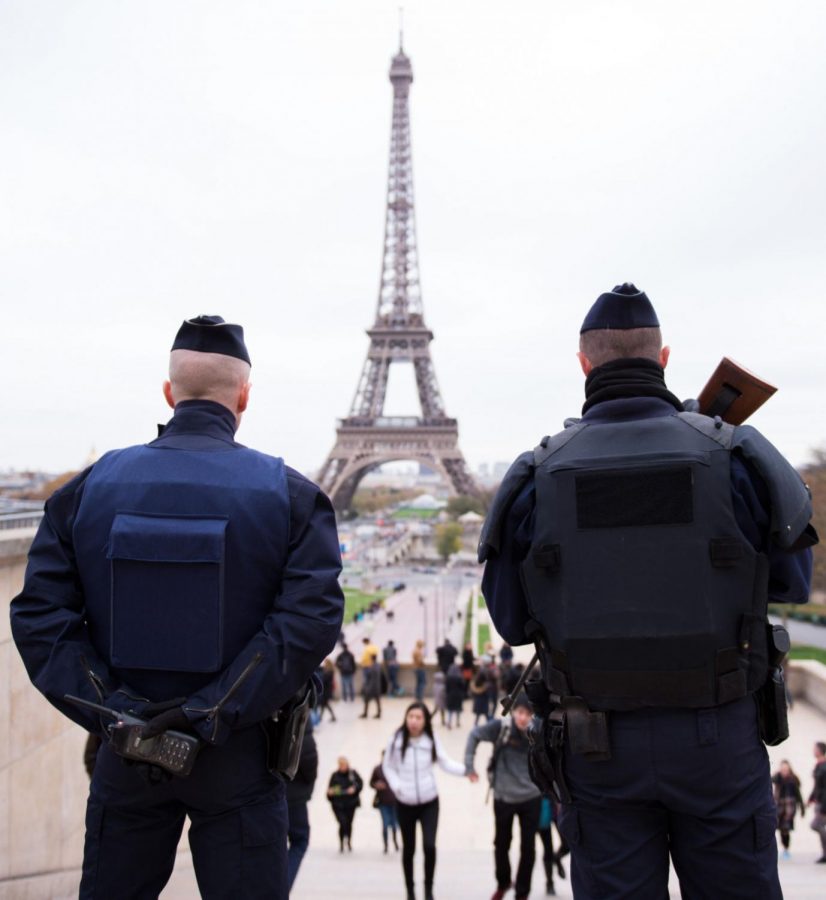St. Edward’s community reacts to terrorist attacks in Paris
Editor’s Note: This story has been updated throughout.
St. Edward’s University alumna Marie Vilsange is afraid. She’s afraid to walk the streets. She’s even afraid to leave her apartment.
“Paris is no longer a safe city.”
That is how Vilsange describes her home after Friday’s series of six terrorist attacks killed at least 129 and injured 325 people. The Islamic State has claimed responsibility for the attacks, one of the deadliest attacks in France since World War II.
“I was a bit far from the attacks, but I could hear all the ambulances, and police driving all night like crazy,” Vilsange said. “Helicopters were flying above Paris. Honestly, it was terrifying.”
Vilsange lives in Paris’ 15th arrondissement — Paris’ most populous district. The attacks occurred in the 10th and 11th arrondissements, which are located northeast of the Seine River that divides the city.
Vilsange’s first reaction after she heard about the attacks was to call her brother, who also lives in Paris, to check to see if he was okay.
“Then I locked my door and called my mom to let her know that everything was fine,” Vilsange said.
Two of Vilsange’s friends were at Le Carillon, one of the bars that was attacked. One friend was shot three times and is currently in the hospital.
“He will be alright thanks to God, but won’t be able to walk for at least three months,” Vilsange said. “The other one wasn’t hurt but is in total shock.”
Vilsange said her cousin’s roommate lost her brother in the attack at the Bataclan theater.
“We entered a war against terrorism,” Vilsange said. “Paris is in mourning.”
Students studying abroad
All 41 SEU students and two faculty members studying abroad in France have spoken with the university after Friday’s terrorist attacks in Paris, according to SEU. This semester, there are a total of 130 students studying abroad worldwide, said Mischelle Diaz, St. Edward’s communications director.
“While we were blessed that our own students and faculty abroad were all safe, we have Hilltoppers among us who call France their home and we want to express our solidarity and support,” Lisa Kirkpatrick said, vice president for student affairs, in an email sent to students Monday. “Something as unsettling and devastating as these terrorist attacks require that we all take care of ourselves and look out for one another.”
Sophomore Christelle Miller, who is studying abroad in Angers, France, said the Office of International Education emailed her and other students in France to check if they were OK. At the time of the attacks, Miller was in Switzerland.
“As far as I know, everyone in the program is alright and safe,” Miller said. “I’m in shock at the amount of hatred people can harbor against one another; however, the solidarity seen in Paris and worldwide is amazing to see.”
Senior Korissa Felán and her study abroad program, API, have a trip to Paris planned in a week-and-a-half. Felán is still waiting for API to give her group the go ahead to travel to Paris. Felán is studying abroad in Sevilla, Spain.
“It’s hard to tell what will come next and that makes me extremely nervous about going,” she said. “However, I feel that it is important to still go because I believe that by not going, out of fear, I will be giving the terrorists exactly what they want. They want to spread their hatred by instilling terror into the hearts of innocent people and instead, I think it’s important to show strength during these devastating times.”
While Felán still wants to make the trip, her family is strongly opposed to her going.
“I’ve been told that security in Paris will be heavily enforced,” she said.
While she may not be in Paris or France, Felán still worries about her safety in Spain. Felán feels safer in Sevilla than larger cities, like Madrid or Barcelona.
Madrid was the target of a terrorist attack in 2004 when a terrorist cell inspired by Al-Qaida attacked the subway system. Felán says that attack is still fresh in people’s minds.
“I’m traveling to both those cities this weekend, and I’m pretty scared about what could happen,” Felán said.
If a situation in a country becomes severe enough, St. Edward’s will pull students from the countries they are studying in, said Bill Clabby, associate vice president for Global Initiatives.
The university monitors situations as they arise and rely on the United States State Department’s assessments of countries to make any decisions about students.
“We are in contact with [students] on an ongoing basis,” Clabby said. “We reach students in a variety of different ways, including using their SEU email account and other contact information that students have provided to us.”
Junior Esther Canesson, who is from France, heard about the attacks through a breaking news alert Friday between 3 and 3:30 p.m.
Most of her family lives far from Paris except for her uncle, who was at the stadium that was attacked. Canesson said everyone in her family is fine.
“I felt [shocked] at first,” Canesson said. “Little by little, we heard about more attacks. Now, honestly I am nervous and scared for the rest of the population. In a year, we had two attacks against our values and principles. But people are right! We are united against terrorism and those who are against freedom.”
Rosemond Crown and Jacob Rogers contributed to this report.







